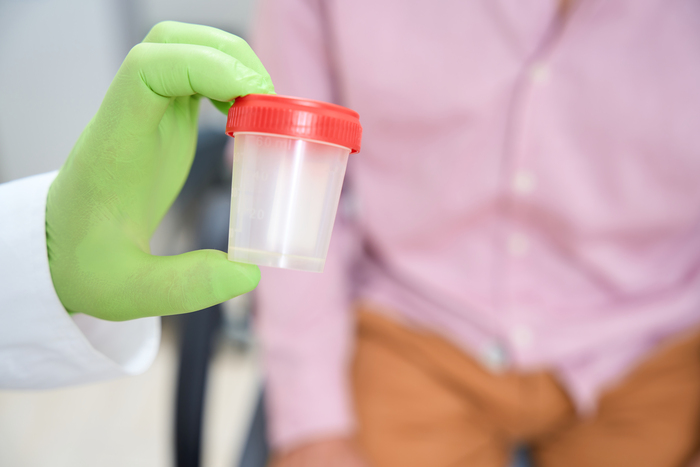
Ensure your health. Get tested today.
Convenient lab testing at your fingertips at more than 5,000 locations nationally. Consult with a doctor, or get tested on your own.

Stool tests are laboratory analyses conducted on a sample of stool to assess various aspects of gastrointestinal health, according to the NLM. These tests play a crucial role in diagnosing a wide range of conditions affecting the digestive system. Research published on the NLM notes that by examining the composition of stool, healthcare providers can gather important information about the presence of infections, blood, or abnormal substances, which can indicate underlying health issues.
There are several types of stool tests, according to the NLM, each designed to evaluate specific concerns. For instance, a fecal occult blood test (FOBT) is used to detect hidden blood in the stool, which can be a sign of colorectal cancer or other gastrointestinal disorders. Another common type is the stool culture, which identifies pathogens responsible for infections, such as bacteria, viruses, or parasites. Additionally, tests for fat content can help diagnose malabsorption disorders, where the body fails to absorb nutrients effectively. Overall, stool tests are a non-invasive and valuable tool in the early detection and management of gastrointestinal diseases.
Stool tests are performed for various reasons, according to the NLM — they note that stool tests are done primarily to investigate gastrointestinal health and identify potential infections or disorders affecting the intestines. By analyzing stool samples, healthcare providers can determine if there is an infection caused by bacteria or parasites, as well as assess other digestive issues. This non-invasive test provides valuable insights into the functioning of the gastrointestinal system, helping to guide further diagnostic and treatment options.
Some of the gastrointestinal conditions that can be identified through stool tests, according to the NLM, include:
Infection of the gastrointestinal system by certain types of bacteria, viruses, or parasites
Digestive problems, such as difficulties in absorbing specific types of sugars, fats, or nutrients
Bleeding within the gastrointestinal system, which may indicate ulcers or tumors
Allergies or inflammation, such as those resulting from a milk protein allergy in infants
Chronic conditions like inflammatory bowel disease (IBD), including Crohn's disease and ulcerative colitis
By uncovering these issues, stool tests play a critical role in ensuring timely and appropriate medical intervention.
There are several types of stool tests, each designed to evaluate specific aspects of gastrointestinal health and diagnose various conditions, according to the Merck Manuals. These tests can provide crucial information about the presence of blood, infections, or abnormalities in the digestive system.
Some common types of stool tests and their purposes:
Fecal Occult Blood Test (FOBT): This test detects hidden (occult) blood in the stool, which can be an early sign of colorectal cancer or other gastrointestinal issues. It typically involves collecting stool samples over several days to ensure accurate results.
FIT-DNA Test: The Fecal Immunochemical Test (FIT) combined with DNA analysis is a more advanced screening tool for colorectal cancer. It not only checks for blood in the stool but also analyzes DNA markers associated with cancerous or precancerous cells.
Tests for Infection: These tests are designed to identify the presence of pathogens such as bacteria, viruses, or parasites in the stool. Common examples include stool cultures, which can grow and identify infectious organisms, and tests for specific toxins produced by pathogens like Clostridium difficile.
Each of these tests serves a distinct purpose in diagnosing gastrointestinal conditions and guiding appropriate treatment options.
Preparing for a stool test is generally straightforward, as there are typically no special preparations required according to the Merck Manuals. However, they note that in some cases, healthcare providers may give specific instructions to ensure the accuracy of the test results.
While most stool tests do not necessitate dietary restrictions or changes in medication, your doctor may recommend avoiding certain foods or medications that could interfere with the results. For example, if you are undergoing a fecal occult blood test, you might be advised to avoid red meat, certain vegetables, and vitamin supplements for a few days prior to the test, as these can affect the detection of blood in the stool. It’s always best to consult with your healthcare provider before the test to get personalized instructions tailored to your specific situation. By following their guidance, you can help ensure that the results are as accurate and informative as possible.
Collecting a stool sample may seem daunting, but following a few simple steps provided by the Merck Manuals can make the process straightforward and efficient. Proper collection is essential to ensure accurate test results, so it’s important to adhere to specific guidelines.
Below are general steps to help you collect your stool sample correctly, according to the Merck Manuals:
Avoid mixing urine with your stool sample, as this contamination can interfere with the test results.
Place a clean container or something in the toilet to catch your stool. This could be a specialized stool collection device or a clean plastic wrap stretched over the toilet bowl.
Make sure your stool does not touch the inside of the toilet bowl, as this can introduce contaminants that may affect the sample.
Use a plastic scoop (often provided with the collection kit) to transfer a small portion of the stool into the specimen container.
Close the specimen container immediately and secure the lid tightly to prevent leakage or contamination.
If there’s remaining stool, carefully tip it into the toilet to dispose of it properly.
Deliver your specimen to the lab or your healthcare provider’s office as soon as possible. If you need to wait for any reason, you can keep your sample in the refrigerator for a short time. However, if you don’t return your sample within 24 hours, it may not be viable for testing.
Understanding the results of your stool test is crucial for assessing your gastrointestinal health and determining the next steps in your care, according to the NLM. They note that the results can be either positive or negative, each conveying important information about your digestive system. A negative result typically indicates that the laboratory did not find any signs of disease, such as blood, pathogens, or other abnormalities in your stool sample. This can be reassuring, suggesting that there are no immediate concerns regarding infections or gastrointestinal disorders.
On the other hand, a positive result means that the test has detected something unusual, according to the NLM. For instance, if the test identifies the presence of a germ, the results may also specify the type of pathogen responsible for the infection. This information is vital, as it allows your healthcare provider to tailor a treatment plan based on the specific organism identified. Whether the results are positive or negative, your healthcare provider will discuss the implications with you and recommend any necessary follow-up actions to ensure your health and well-being.
If you're in need of lab tests, including stool tests, look no further than SolvHealth to simplify your search. SolvHealth provides a user-friendly platform that allows you to easily find and schedule lab tests near you, ensuring quick access to the diagnostic services you need. With a wide range of testing options and the ability to compare local providers, SolvHealth makes it convenient to take charge of your health. Don’t wait—explore your options today and get the testing you need with confidence!
A stool test may be recommended if you are experiencing persistent stomach problems such as diarrhea, abdominal pain, or unusual changes in bowel habits. It is used to diagnose a variety of gastrointestinal diseases.
Common types of stool tests include the fecal occult blood test, which detects hidden blood in the stool, and the stool culture, which identifies pathogens responsible for infections. Tests for fat content can help diagnose malabsorption disorders.
Generally, no special preparations are required for a stool test. However, in some cases, your doctor may advise you to avoid certain foods or medications that could interfere with the results. Always consult with your healthcare provider for personalized instructions.
A negative result typically indicates no signs of disease, while a positive result means the test has detected something unusual such as blood, pathogens, or other abnormalities. Your healthcare provider will discuss the results and any necessary follow-up actions with you.
You should avoid mixing urine with your stool sample, use a clean container to catch your stool, transfer a small portion of the stool into the specimen container, and deliver your specimen to the lab or your healthcare provider’s office as soon as possible.

Convenient lab testing at your fingertips at more than 5,000 locations nationally. Consult with a doctor, or get tested on your own.